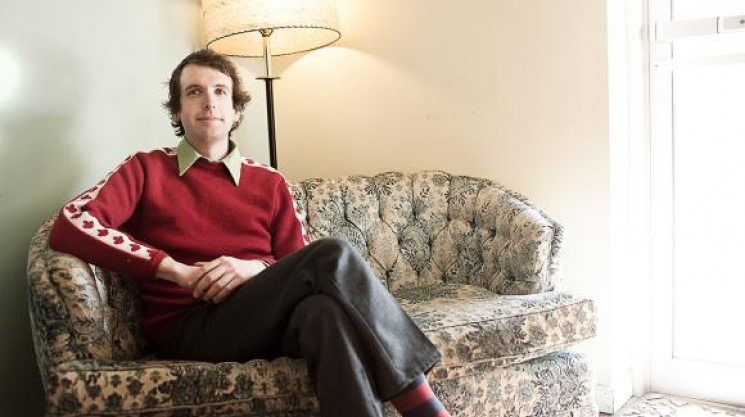
Thu, 07/25/2013 - 15:16 by Natasha Neale
Shotgun Jimmie likes life, and we think that’s a damn nice thing. We asked Kate Shepherd to talk to him on behalf of ION and find out more about his continual touring, living it up and loving the sunshine.
Against a backdrop of vintage furnishings and kitschy décor, Jim Kilpatrick finally takes a break for a coffee. He’s spent the better part of the day so far traveling to, and unpacking in, a small café on the edge of Ottawa’s Chinatown, a task that most would agree has earned him a chance to enjoy one of its caffeinated offerings. Touring for his newest album, and others before it, has frequently brought him to places like this one – pockets of comfort dotting the long Canadian highways with which he’s grown familiar.
Kilpatrick, more widely known by his stage moniker, Shotgun Jimmie, looks as comfortable amidst the eclectic mishmash of chairs and patterned tabletops as most people would in their own homes, and it makes sense. Perhaps as much as anything else, his latest album, March’s Everything, Everything, is a testament to a life, at least recently, lived on the road.
Today, Kilpatrick has touched down in the capital for a show on the cozy stage at Raw Sugar, its floral couches and brightly coloured lamps now overrun with the gear that he’s just transferred from his van with practiced efficiency. “I do tour a lot,” he says, seated in a corner of the venue that doubles as a small library. “I’ve spent the last couple of years on the road, basically.”
Part of that highway-bound stint was in the company of the Weakerthans’ John K. Samson, whose 2012 solo LP, Provincial, featured some of Kilpatrick’s guitar work. He joined Samson on an extensive tour of North America and Europe, an arrangement that offered what Kilpatrick calls “the lap of luxury” – a tour bus, and time to get out and enjoy the European cities they passed through.
“Someone else does the driving, and someone else worries about finding parking and all that stuff,” he says. “I embraced it fully, and went to lots of museums, went for runs.”
The experience stands in stark contrast to Kilpatrick’s usual touring routine–a solo affair that offers more logistical freedom, but less time to see the sights. Take the Ontario leg of his current tour for example, during which constant movement left no time for nerves before his opening show in Toronto. The decision to kick off in a city that most artists would use as a capstone to their tour was unusual, but to Kilpatrick, it made sense. “I’d just driven straight from Thunder Bay, so I didn’t have time to get stressed out,” he explains. “I got off the highway, and just went in the bar and played the show. Just ripping the Band-Aid off, so to speak.”
The show, and the audience’s reaction, was enough to dispel any remaining jitters that Kilpatrick might have had leading up to the tour. “It went off without a hitch,” he says. “I had an amazing response right off the get-go.”
That initial reception has been repeated at subsequent stops, with each performance helping to assuage the pressure of following up what many critics hailed as Kilpatrick’s finest work. His fifth album, 2011’s Transistor Sister, was long listed for the Polaris Music Prize that year, and garnered significant praise from fans and industry figures alike. “There was a bit of pressure,” Kilpatrick says. “I mean, I always want to make a good album, but I’ve never had critical acclaim before. So I was nervous about it, but as soon as I got on tour, I realized that everything was ok.”
His show in Ottawa is among the last of his dates in eastern Canada, after which he’ll get a 10-day break from the road at home in Manitoba, but the pause from touring doesn’t mean Kilpatrick will be taking it easy. He recently bought a house, and will be spending the time moving in. That short respite will be followed by a string of West Coast dates, which will see him returning to the side of the continent that inspired a handful of tracks on Everything, Everything. Songs like “Big Sur” and “Carry On” were penned while reminiscing about warmer times on the Pacific Coast, and emanate a sense of exhilaration that generally goes hand-in-hand with the road. “It’s so great down there,” he says. “I was writing and recording part of the record last winter in Manitoba, and I was dreaming about Texas and California, and actually went on a trip to Big Sur. It was a creative inspiration for sure.”
When it came down to recording the album, Kilpatrick holed up in a remote cabin in Lake Clementi, MB, renting equipment by the month. The process was a departure from the production of his last effort, which he says was completed in two weeks. “The vision of the record, for me, was to do it all myself, and to take time,” he says. “You don’t have to coordinate with engineers, or studios or other musicians. You can just work on your own schedule.”
He says that taking the extra time made for a record of completely realized songs, and although many of them are brief (tunes like “Standing in a Line” and “Skype Date” clock in at barely over a minute), their concision is a product of careful construction rather than thoughtlessness. “I would start with a song or an idea and then I would just keep taking it apart until it got to this sort of simplest form,” Kilpatrick explains. “They feel like they’re finished in a way that they haven’t been in the past. There’s a few moments where songs will end on a cue or a punch line, where there's a little riff that lets you know that it’s all tied up.”
Another recurring theme is Kilpatrick’s preoccupation with everyday scenes and situations. Many of the songs are vignettes, brief but potent summations of sentiments or events that could easily be rendered mundane in the hands of another songwriter. “It does deal with very common, day-to-day events, themes or images, and it tries to colour them a little, through energy and excitement,” he says. “It’s a celebration of the normal aspects of my life, `cause I’m pretty happy with my life. It’s a pretty positive record.”
It’s also one that features the talents of several of Kilpatrick’s friends and former band mates, including Julie Doiron, but he says that the appearances function more as cameos than collaborations. “There’s a really lovely sense of community in my group of friends – we all work together,” he says. “I still thrive on that music community. Even for someone like me who tours by myself, playing solo, making a record by myself, playing all the parts, I think that those relationships, they are key.”
Those relationships extend to the people that populate his audiences as well, and are part of the reason that he’s keen to continue performing as a one-man-band in the future. He says he enjoys the control that comes with self-production, and removing other band members from the equation enhances the back and forth exchanges with fans during shows.
“I feel this completely different interaction with the audience. It’s a different experience for me, and I take a lot more from it.”
“And,” he adds, dryly, “Band practice is a lot easier to organize.”




Add comment